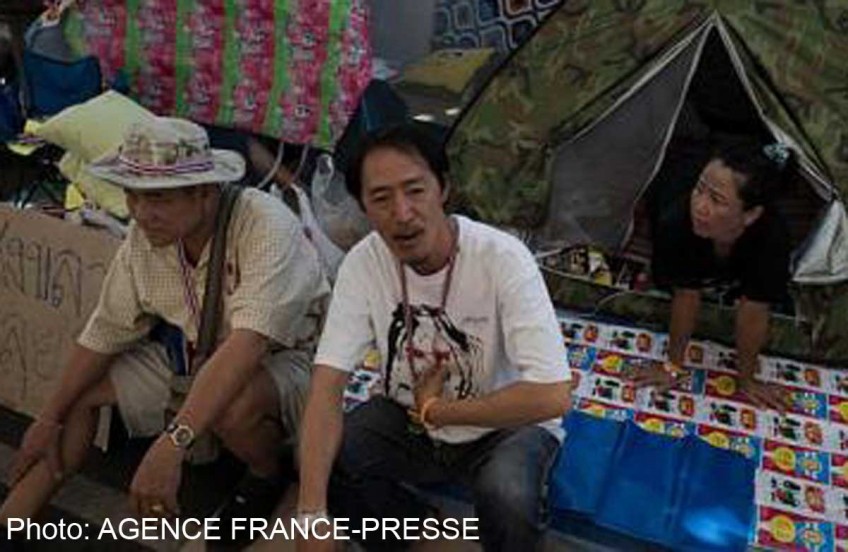Why the noose is tightening around Yingluck's party

ANTI-GOVERNMENT protesters will swarm Bangkok today in their latest attempt to bring down the caretaker government of Ms Yingluck Shinawatra.
But that may be the least of her worries.
While whistle-blowing demonstrators have hogged the headlines since late October, various Thai institutions have been - by design or chance - steadily undermining her Puea Thai party-led administration.
Despite sustained blockades by protesters at candidate registration venues, the Election Commission has largely stayed with those locations. It has also not extended registration beyond the Jan 1 deadline, even though the blockades have stopped candidates from registering in 28 constituencies in the south, the stronghold of the opposition Democrats who are boycotting the elections.
Instead, the Election Commission has repeatedly suggested that the caretaker government postpone the polls, even though the government has no legal power to do so.
A frustrated caretaker Deputy Premier Phongthep Thepkanjana, a former judge, told foreign correspondents last Friday that he had already explained the legal boundaries to the Election Commission.
"Unfortunately, the Election Commission does not follow our advice," he said.
Thailand's Constitutional Court, whose rulings have in the past forced out two prime ministers linked to Puea Thai's current politicians, has also thrown in some obstacles.
Its recent rulings have centred on the attempts by the Puea Thai and its allies to amend the 2007 Constitution, authored by an interim body put in place after a military coup ousted then Premier Thaksin Shinawatra, Ms Yingluck's brother.
Last year, the court ruled that Puea Thai's attempt to revert the Senate to a fully elected body - instead of one with half of its members appointed - was unlawful, paving the way for an impeachment of the politicians behind the move.
The National Anti-Corruption Commission jumped in to investigate more than 300 politicians, many of whom are Puea Thai candidates for the Feb 2 election. This means that even if they are elected, they could be relieved of their duties or even banned from politics in the coming months.
Last Wednesday, the Constitutional Court outlawed another attempt to amend part of the 2007 Charter related to international agreements, sowing the seeds of another impeachment.
Meanwhile, the court could kill a flagship project of Puea Thai's. Its judges are examining the legality of a 2 trillion baht (S$76.7 billion) loan to bring high-speed trains to the kingdom, among other transport improvements.
Then there is the military, which has attempted no fewer than 18 coups in Thailand's 82 years as a democracy. Army chief Prayuth Chan-ocha has promised not to take sides, but has not ruled out another coup. A military coup would unleash the fury of pro-government "red shirt" supporters around the country, who have declared they will not stand idly by if the government they voted in is ousted in yet another military putsch.
Still, the military's ambiguity has emboldened protesters, who believe it will not intervene if they occupy government buildings in their bid to force Ms Yingluck to step down.
Slowly but surely, the noose is being tightened around Puea Thai, which is up against the old money, urban middle class and establishment groups jockeying for position ahead of a looming royal succession. If a military coup is out of question, and a "people's coup" is too ineffectual, a "judicial coup" might just do the trick.
"If you hit a snake, kill it, or it will come back and bite you," said an anti-government protester, citing a Thai proverb. She was no doubt encouraged by protest leader Suthep Thaugsuban's message to Ms Yingluck last Saturday night that "you and your cronies will have no place left to stand".
The anti-Thaksin camp is expecting no less than a complete victory. The only problem is that a hardline attitude begets a hardline response. It ripens the ground for a civil war, even if protest leaders have promised to prevent it from happening.
More than 90 people died on the streets of Bangkok during the last spurt of political violence.
Given the escalating political tension, both sides are keenly aware that more people could lose their lives this time. The question is: Who will blink first?

Get a copy of The Straits Times or go to straitstimes.com for more stories.